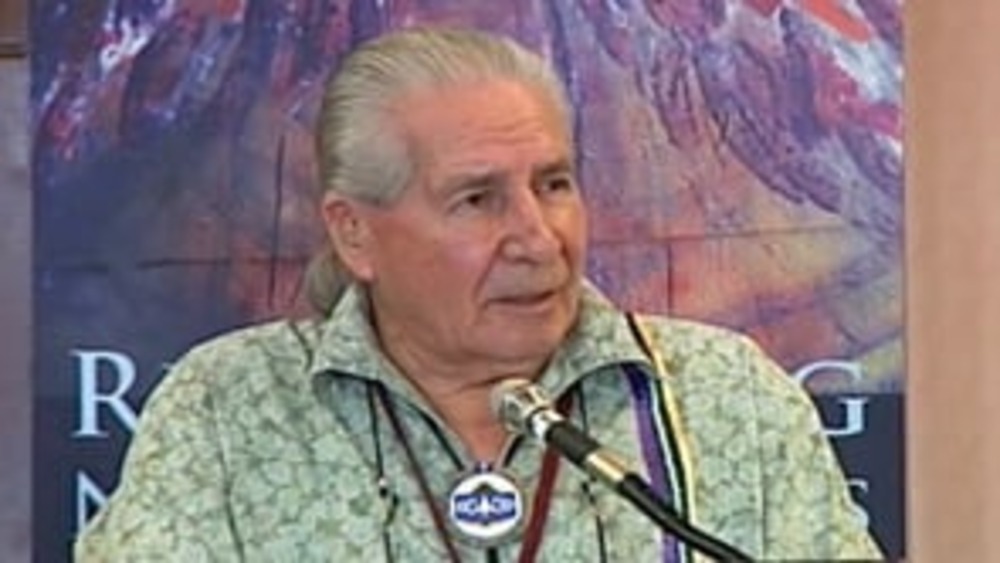Indigenous Governance Database
Harvard Project "Honoring Nations" Symposium 2007

From the Rebuilding Native Nations Course Series: "The Strategic Approach to Leadership"
Native leaders discuss why it is important for Native nation leaders to take a strategic approach to leadership, stressing that the decisions they make must be made with the culture and values of their people and the next seven generations in mind.
Honoring Nations: Sovereignty Today: Q&A
The 2007 Honoring Nations symposium "Sovereignty Today" panel presenters as well as members of the Honoring Nations Board of Governors field questions from the audience and offer their thoughts on the state of tribal sovereignty today and the challenges that lie ahead.
Honoring Nations: Kristi Coker-Bias and Allen Pemberton: The Citizen Potawatomi Community Development Corporation and the Red Lake Walleye Recovery Program (Q&A)
Honoring Nations symposium presenters Kristi Coker-Bias and Allen Pemberton field questions from the audience about the Citizen Potawatomi Community Development Corporation and the Red Lake Walleye Recovery Program.
Honoring Nations: Mary Etsitty: The Navajo Nation Sales Tax
Mary Etsitty, Former Executive Director of the Office of the Navajo Tax Commission, discusses how and why the Navajo Nation sales tax was established, and how the Office of the Navajo Tax Commission works to consult and educate Navajo citizens about the need for -- and benefits of --…
Honoring Nations: David Gipp: Sovereignty Today
President David Gipp of United Tribes Technical College synthesizes the words of the "Sovereignty Today" presenters at the 2007 Honoring Nations symposium, and discusses the direct relationship between a Native nation's effective exercise of sovereignty and its distinct traditional cultural values…
Honoring Nations: LuAnn Leonard: The Hopi Education Endowment Fund
Hopi Education Endowment Fund Executive Director LuAnn Leonard (Hopi/Tohono O'odham) speaks about the purpose and growth of the Hopi Education Endowment Fund and how the initiative has inspired those HEEF serves to answer the question: What does it mean to be a Hopi?
Honoring Nations: James Ransom: Sovereignty Today
Former Saint Regis Mohawk Chairman James Ransom provides his perspective on what sovereignty means today, and stresses the importance of using traditional Indigenous teachings in modern Native nation governance.
Honoring Nations: Don Corbine: The Bad River Chippewa Recycling/Solid Waste Department
Former Manager Don Corbine of the Bad River Recycling/Sold Waste Department shares how the Bad River Band of Lake Superior Chippewa Tribe is using recycling to clean up their community and reinvigorate community pride among its citizens.
Honoring Nations: Ken James: The Flandreau Police Department (2007)
Former Flandreau (South Dakota) Police Chief Ken James discusses how the Flandreau Police Department works to provide culturally sensitive law enforcement to all of the citizens it serves.
Honoring Nations: Devin Redbird: The Gila River Youth Council
Devin Redbird discusses the importance of the Gila River youth council as a source of education and development for the next generation of tribal leaders, while stressing the impact youth councils could have across Native nations.
Honoring Nations: Patricia Ninham-Hoeft: Oneida Nation Farms
Patty Ninham-Hoeft, Business Committee Secretary for the Oneida Nation of Wisconsin, discusses the impact of Oneida Nation Farms on the Oneida community and how it is a concrete expression of tribal sovereignty.
Honoring Nations: Juana Majel-Dixon: The Violence Against Women Task Force
Juana Majel-Dixon, Chair of NCAI's Task Force on Violence Against Women, reflects on the work of the Task Force on Violence Against Women and their efforts to push for passage of the Violence Against Women Act in Congress.
Honoring Nations: Joyce Country and Dorry Larson: The Sisseton Wahpeton Oyate Professional Empowerment Program (2007)
Joyce Country and Dr. Dorry Larson discuss what prompted the Sisseton Wahpeton Oyate to establish its award-winning Professional Empowerment Program, and the positive impacts it is having on the lives of its citizens.
Honoring Nations: Kristi Coker-Bias: The Citizen Potawatomi Community Development Corporation
Former Executive Director Kristi Coker-Bias provides on overview of the Citizen Potowatomi Community Development Corporation and discusses how it is working to cultivate private sector development in her community, which she says is essential to Native nations' efforts to develop sustainable…
Honoring Nations: Elvera Sargent: The Akwesasne Freedom School
Elvera Sargent discusses the Akwesasne Freedom School and the role it plays in the cultural identity of each generation that goes through the curriculum.
Honoring Nations: Oren Lyons: Rebuilding Healthy Nations
Onondaga Chief and Faithkeeper Oren Lyons urges Native nations to continue sharing their stories of success, learning from each other, and working towards creating a better future for the next seven generations.
Honoring Nations: Michael Thomas: Sovereignty Today
Former Mashantucket Pequot Chairman Michael Thomas provides his definition of what tribal sovereignty means in the 21st century, and stresses the importance of Native nations examining and reconnecting with their traditional governance principles as they work to exercise sovereignty effectively.
Honoring Nations: Joseph P. Kalt: Rebuilding Healthy Nations
Harvard Project Co-Director Joseph P. Kalt provides a general overview of the Honoring Nations program and illustrates how people all over the world are learning from the nation-building examples set and the lessons offered by Native nations in the United States.
Honoring Nations: Jon Waterhouse and Rob Rosenfeld: The Yukon River Inter-Tribal Watershed Council
Jon Waterhouse and Rob Rosenfeld provide an overview of the work accomplished by the Yukon River Inter-Tribal Watershed Council, demonstrating the benefits of Native nations who have common cultures and challenges to band together to solve issues of mutual concern.
Honoring Nations: Brian Cladoosby: Sovereignty Today
Swinomish Chairman Brian Cladoosby offers his perspective on what tribal sovereignty means today. He argues that the long-term sustainability of Native nations hinges on their right and ability to decide their own affairs and determine their own futures, and stresses the importance of educating…
